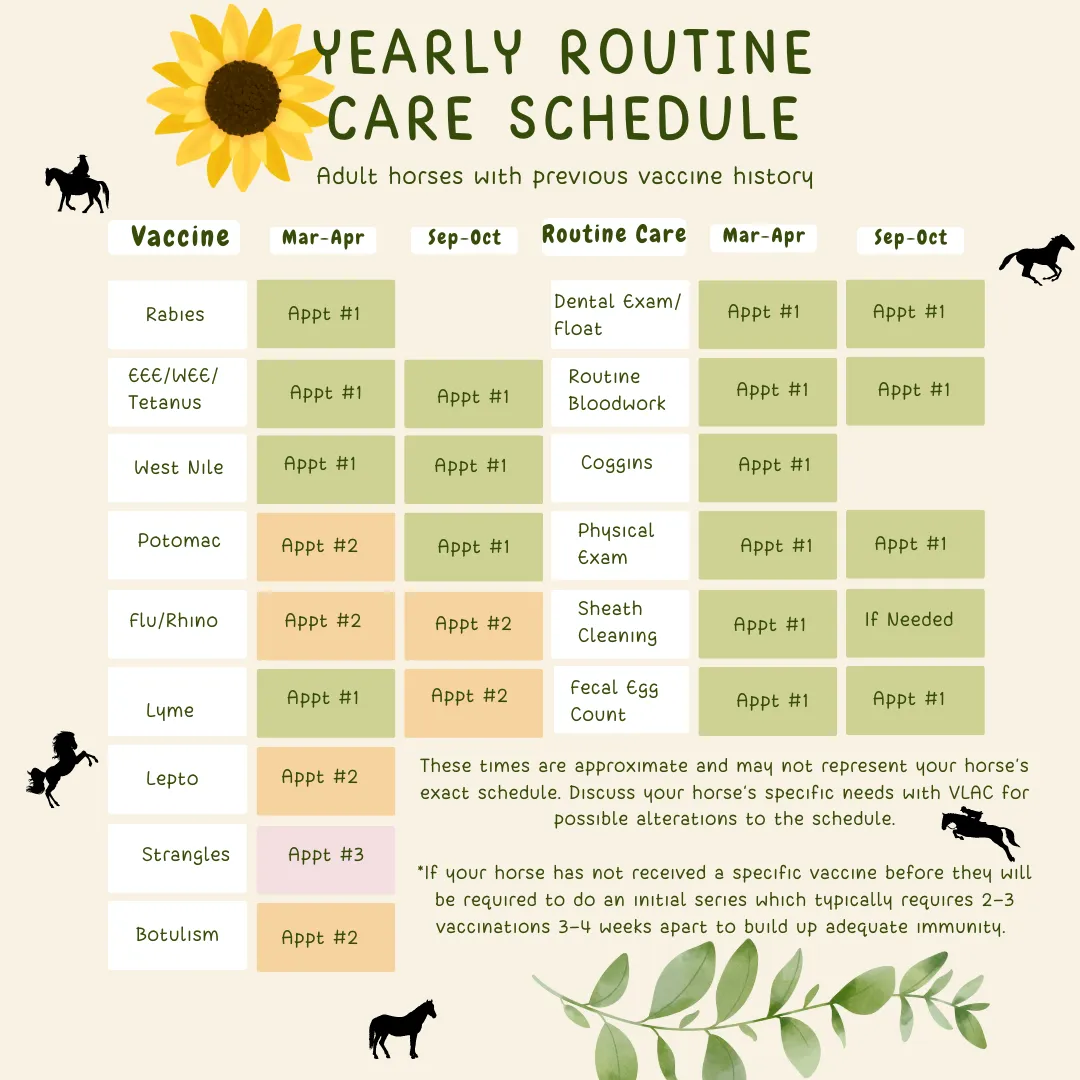Recommendations for Equine Preventive Care
The following is further information on each core and risk-based vaccine. This also outlines our other recommendations such as fecal examinations and dentistry. Our veterinarians will help you come up with an individualized plan that best suits your horse. For more information please refer to the following website from the American Association of Equine Practitioners: https://aaep.org/guidelines/vaccination-guidelines
If your horse has not had a particular vaccine before, then they will likely require an initial series to build up adequate immunity.
Core Vaccines:
- Rabies:
- Protects against a deadly neurologic illness acquired by contact with the saliva of an infected and shedding animal. Rabies is transmissible from horses to humans and is almost always fatal.
- Horses are more susceptible to rabies due to the environments of typical rabies vectors (skunks, raccoons, bats etc.) closely bordering the habitat of most horses.
- Only needs to be administered once yearly.
- Eastern and Western Equine Encephalitis (EEE/WEE):
- Protects against viruses transmitted to horses by infected mosquitoes. They cause neurologic symptoms and have a high mortality rate.
- Due to the prevalence of mosquitoes in our area, we recommend twice yearly vaccinations (Spring and Fall)
- Tetanus:
- Protects against a deadly neurologic disease acquired from bacterial spores in the environment that enter the horse through wounds. The bacteria are present in all soils.
- We recommend twice yearly vaccinations (Spring and Fall) or vaccinations if your horse has a wound but has not received a vaccine in the last 5-6 months.
- West Nile Virus (WNV):
- Protects against a virus transmitted to horses by infected mosquitoes. It causes neurologic symptoms and has a high mortality rate.
- Because of the prevalence in our area of mosquitoes and virus we recommend twice yearly vaccinations (Spring and Fall)
- Potomac Horse Fever (PHF):
- Protects against a bacterial illness acquired from ingestion of an intermediate host (aquatic insects.) Though this vaccine does not reliably prevent infection, it reduces the severity of clinical signs such as diarrhea, fever, and laminitis.
- Our area considers this vaccine “core” due to the high prevalence of confirmed cases. Especially for horses living close to standing water.
- We recommend Spring and Summer vaccinations to maintain immunity throughout the season when infection is most likely.
Risk-Based Vaccines:
- Lyme:
- We recommend vaccination for Lyme Disease because we have no other method of prevention (aside from grooming and topical pesticides that are minimally effective).
- The initial series is 3 vaccinations, scheduled 1 month apart. The initial series should be followed every 6 months with a booster.
- Leptospirosis:
- Protects against infection from a bacterial organism shed in the urine of infected animals, such as rodents and deer, and transmitted via mucous membrane or abraded skin.
- Leptospirosis affects multiple body systems and can cause uveitis and spontaneous abortion.
- Once yearly administration is recommended for horses in close proximity to standing water or low-lying pastures.
- Botulism:
- Protects against disease from a bacterial toxin ingested in certain feed sources (hay and chopped forage). Recommended for animals who eat round bales or fermented forage sources.
- Once yearly administration is recommended.
- Influenza:
- Vaccine against a highly contagious airborne virus causing fever and respiratory disease.
- The vaccine is only effective for a few months and should be given at least every 6 months to all horses traveling or contacting new horses.
- Equine Herpes Viruses 1 and 4 (Rhinopneumonitis):
- Vaccine against common viruses that cause fever, respiratory, and sometimes other signs including abortion and neurologic disease. Many horses are latently infected with these viruses, but the vaccines help to decrease viral shedding and illness from repeat infection.
- The vaccine is only effective for a few months and should be given at least every 6 months to all horses traveling or contacting new horses.
- It is important to give pregnant mares EHV-1 vaccines at months 5, 7, and 9 of gestation.
- Streptococcus equi ssp equi (strangles):
- Vaccine against a highly contagious bacterial respiratory illness. There are both intranasal and intramuscular vaccines available. The intranasal vaccine is a modified live product that we do not give at the same appointment at which we are giving intramuscular vaccines or other injections.
- Horses most at risk are young horses coming into close contact with many unfamiliar horses.
- Once yearly administration is recommended.
Physical Examination:
- A wellness exam to gauge vital signs, overall health, body condition, etc. This is also an opportunity to go over your horse’s routine care and any questions or concerns.
Blood testing:
- Vitamin E and Selenium testing- these nutrients are in low supply in our area:
- Complete Blood Count and Chemistry panel:
- Like for humans, this basic blood work checks out the numbers of different blood cell components and concentrations of electrolytes, proteins, and organ-specific enzymes like for those of the liver and kidneys. It gives a general picture of internal health issues that may be developing in your horse and can assist us in earlier diagnosis of an asymptomatic patient.
- Can be re-checked twice yearly, especially if starting a new medication or if they have been on long term medication, such as Equioxx or other non-steroidal anti-inflammatory drugs (NSAID’s.)
- Lyme Titer Testing
- The Lyme Multiplex Assay tests for 3 different Lyme antibody levels (Outer Surface Proteins or OSP):
- OspA positive indicates vaccination has occurred. In up to 5% of cases, OspA positive titers in unvaccinated horses can also occur when other OSP’s are also positive, the biological role is unknown at this time.
- OspC positive indicates exposure to the Lyme organism of at least 2-3 weeks duration.
- OspF positive indicates chronic exposure to the Lyme organism and can be detected 5-8 weeks post infection.
- The available research does not indicate a specific protocol for responding to positive Lyme titers where no clinical signs are evident. For this reason, the AVVS clinicians offer several ways to move forward:
- Repeat titer in 4 weeks and monitor for development of clinical signs. If the titer is rising than treatment may be warranted.
- Monitor horse for clinical signs +/- vaccinate against new exposure to Lyme.
- Treat proactively prior to vaccination.
- The Lyme Multiplex Assay tests for 3 different Lyme antibody levels (Outer Surface Proteins or OSP):
- Endocrine testing:
- Testing your horse’s ACTH levels can assist in the diagnosis of PPID (Equine Cushing’s Disease.)
- The most sensitive testing for PPID is TRH Stimulation which can be done November through July. We do not recommend testing during the months of August through October due to seasonal hormonal elevations.
- We can also test for insulin dysregulation (part of Equine Metabolic Syndrome) with baseline or dynamic tests.
- Can be helpful in determining your horse’s laminitis risk and safety while grazing.
Dentistry:
- Oral Examinations with sedation and a full-mouth speculum: these should be performed once to twice yearly in most horses. They help identify problems that need further attention.
- After the oral examination, we often remove (float) sharp enamel points from tooth surfaces that can cause mouth or tongue sores.
- Younger and older horses, or those with known dental disease, can benefit from twice yearly oral exams and any work required.
Fecal Egg Count (FEC):
- A microscopic examination of manure that allows us to see type and number of parasite eggs. This helps our veterinarians with deworming recommendations to prevent excess egg shedding and avoid parasite resistance to common deworming products.
- The goal is NOT to eliminate your horse’s parasites but to REDUCE the number of parasite eggs shed.
- Perform FEC’s once to twice yearly, preferably during the grazing season and at least 12 weeks after the last dewormer.

